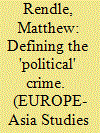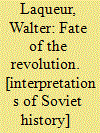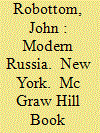|
|
|
Sort Order |
|
|
|
Items / Page
|
|
|
|
|
|
|
| Srl | Item |
| 1 |
ID:
124310


|
|
|
|
|
| Publication |
2013.
|
| Summary/Abstract |
After the October Revolution, the Bolsheviks established revolutionary tribunals to judge 'counter-revolutionary' and 'political' crimes. Amid conflicting reports from contemporaries on the effectiveness of these new courts, this essay examines their development over the first year of their existence. It argues that whilst tribunals were initially too inefficient for the regime, forcing greater central control over them, they played an important role in defining what constituted counter-revolution. In doing so, they promoted the regime's ideology, imparted an image of legality to the regime's actions, and helped the Bolsheviks to exert their control over a fragmented and diverse political landscape.
|
|
|
|
|
|
|
|
|
|
|
|
|
|
|
|
| 2 |
ID:
131154


|
|
|
|
|
| Publication |
2014.
|
| Summary/Abstract |
The article uses a variety of documents, published and unpublished, to explore the 1923 arrest, interrogation and 'trial' of Mirsaid Sultan-Galiev, often considered the Bolsheviks' leading expert on Muslim affairs in the early Soviet period. Contrary to the historiography on this crucial moment in the development of Soviet nationality policy, I argue that Sultan-Galiev was not Stalin's 'first victim'. Rather, responding to the vagaries of Soviet nationality policy, he did indeed violate party discipline in a number of ways, and was engaged in developing conspiratorial ties outside of the party. In fact, the party leaders, and Stalin in particular, treated him less severely than they could have.
|
|
|
|
|
|
|
|
|
|
|
|
|
|
|
|
| 3 |
ID:
032612


|
|
|
|
|
| Publication |
London, WeidenFeld and Nicolson, 1967.
|
| Description |
viii, 216p.Hbk
|
|
|
|
|
|
|
|
|
|
|
|
Copies: C:1/I:0,R:0,Q:0
Circulation
| Accession# | Call# | Current Location | Status | Policy | Location |
| 001134 | 947.089/LAQ 001134 | Main | On Shelf | General | |
|
|
|
|
| 4 |
ID:
029710


|
|
|
|
|
| Publication |
New York, Mc Graw Hill Book Company, 1971.
|
| Description |
160p.
|
| Standard Number |
Hbk.
|
|
|
|
|
|
|
|
|
|
|
|
Copies: C:1/I:0,R:0,Q:0
Circulation
| Accession# | Call# | Current Location | Status | Policy | Location |
| 009019 | 947.084/ROB 009019 | Main | On Shelf | General | |
|
|
|
|
| 5 |
ID:
038639


|
|
|
|
|
| Publication |
London, Rupert Hart-Davis, 1971.
|
| Description |
679p.Hbk
|
| Standard Number |
0246640537
|
|
|
|
|
|
|
|
|
|
|
|
Copies: C:1/I:0,R:0,Q:0
Circulation
| Accession# | Call# | Current Location | Status | Policy | Location |
| 007751 | 923.147/HYD 007751 | Main | On Shelf | General | |
|
|
|
|
| 6 |
ID:
163131


|
|
|
|
|
| Summary/Abstract |
The ideological clash between US President Woodrow Wilson and the Russian Bolshevik leader Vladimir Lenin, which began when the Bolsheviks took power in Russia in late 1917, was a defining moment in the international history of the twentieth century. Throughout his time in power, how-ever, Wilson viewed the Bolshevik threat as merely one part of the global crisis of his era, a crisis that encompassed not only the ongoing world war but also a set of longer term historical forces shaping developments both at home and abroad. So in order to understand Wilson's response to Lenin and the lessons it has for our time, we must first consider the historical context of that relationship.
|
|
|
|
|
|
|
|
|
|
|
|
|
|
|
|
| 7 |
ID:
123227


|
|
|
|
|
| Publication |
2013.
|
| Summary/Abstract |
The history of the Red Army in the Civil War of 1918-1922, in its significant part, was a history of mass treason and desertion of thousands of former officers (military specialists). Among them there were hundreds of General Staff specialists, the real representatives of Soviet military elite, whose treason was extremely dangerous for the fate of Soviet Russia. The treasons were both individual and group when the whole Soviet staffs fled to the Whites. Among the defectors there were representatives of almost all staff and command levels including several army commanders. These specialists of high qualification with academic background were aware of Soviet war plans, mobilization questions, and other classified data and could issue harmful orders before their defection to the enemy and influence the situation on the front. This article describes the reasons, history, circumstances, and results of this process that remained widespread until the decisive victories of the Reds in 1920. According to the calculations by Andrey Ganin, based on the vast, previously unknown data from Russian archives, almost every third General Staff specialist deserted the Red Army during that war. In spite of this, Bolsheviks managed to unite the experience of the military professionals with the new administrative methods and 'with iron and blood' organized powerful and effective military force which finally gained victory in the Civil War.
|
|
|
|
|
|
|
|
|
|
|
|
|
|
|
|
|
|
|
|
|